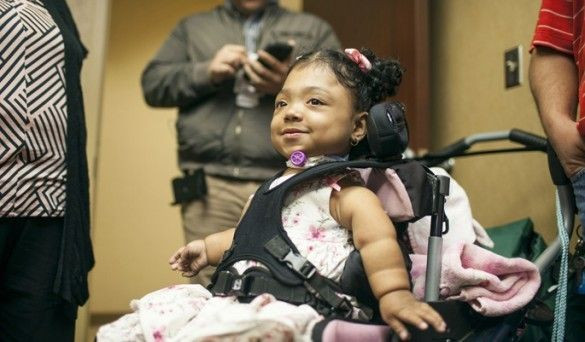Enzyme-Replacement Therapy Helps Regenerate Girl's Fragile Bones

A child with a rare enzyme deficiency disorder that crippled her body from developing bones and teeth was given an experimental drug to grow bones.
The breakthrough enzyme-replacement therapy, asfotase alfa, enabled the young girl to feel her fingers and have traces of bone develop in her body only eight months into the treatment.
"Imagine your child laying all the time in bed, not being able to lift herself, not being able to move herself, making sure she is not falling or tripping on things," her father, Salvadore Martinez, told the Monroe Carell Jr. Children's Hospital at Vanderbilt through a Spanish interpreter.
"The treatment has worked very well but it has been a compilation of doctors, nurses, assistants ... everyone that has been a part of her care that has helped her make a meaningful recovery."
Janelly Martinez-Amador, who turns 7-years-old in May, has hypophosphatasia, or HPP, a genetic disorder that affects one in 100,000 newborns. It disrupts mineralization, which is the process that deposits calcium and phosphorus in bones and teeth--making skeletal system extremely soft. Children with HPP can't absorb the minerals because they don't have the functioning enzyme. Most children would not make it to their first birthday, especially with the severe form of HPP, but Janelly did and she was the most severe case out of 11 patients recruited in this trial.
The results of the therapy were published in the March issue of the New England Journal of Medicine.
Janelly was diagnosed with the condition when she was 3-years-old and doctors were worried that the treatment would be ineffective since past options made no difference. After eight months, the doctors noticed she was able to feel her fingers, which were previously boneless and soft and now they could trace the bones beginning to develop. When doctors checked Janelly with an X-ray after 18 months into the treatment, they noticed first signs of rib cage development.
Her family was able to move the young girl into a wheelchair where for the first time she was able to turn her head and wave to people. Doctors are expecting to administer a cognitive test in July.
HPP occurs when the ALPL gene is mutated and the blueprint for creating alkaline phosphatase enzyme is disrupted. Other mutations could also contribute to milder versions of HPP.



























